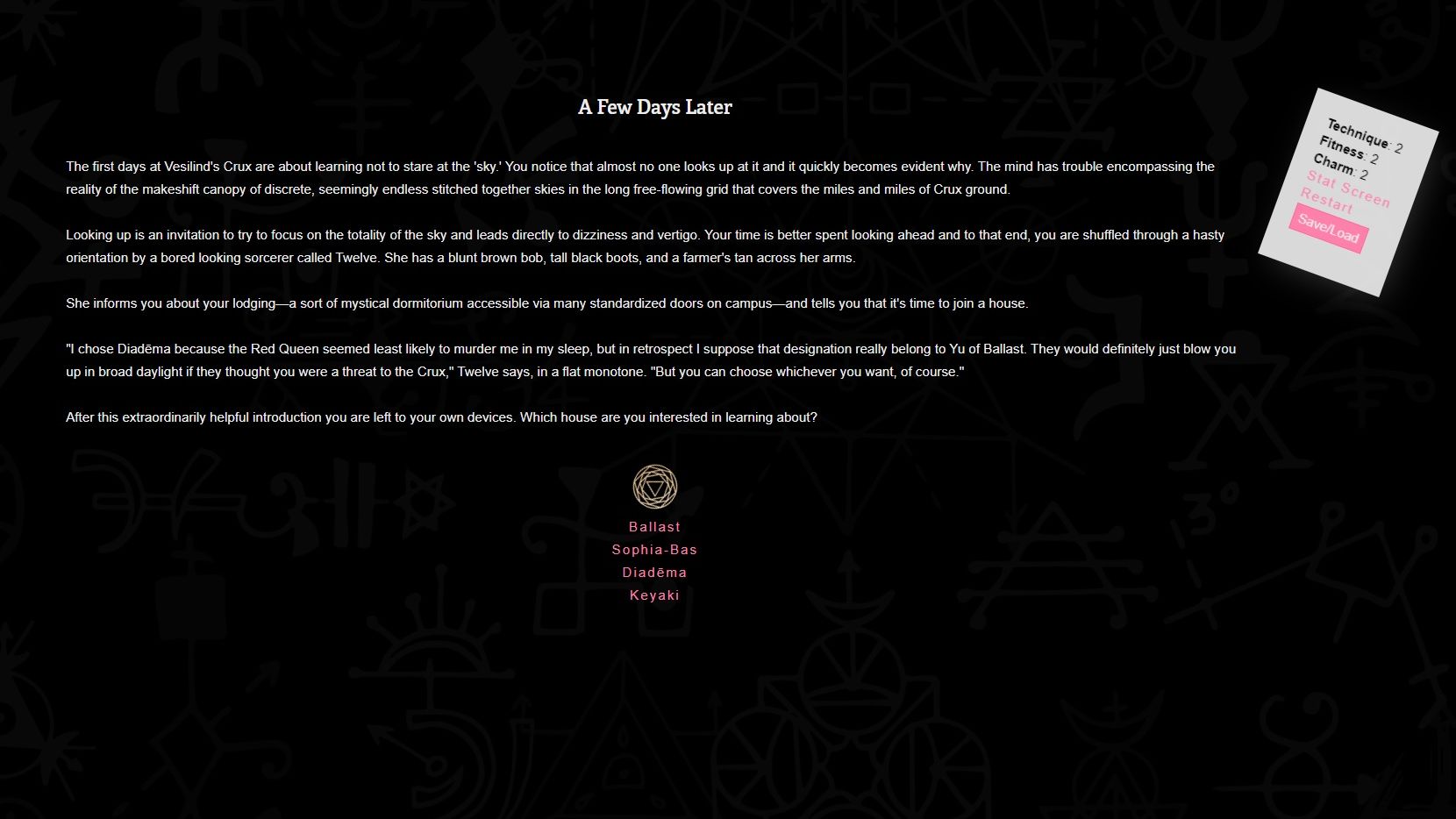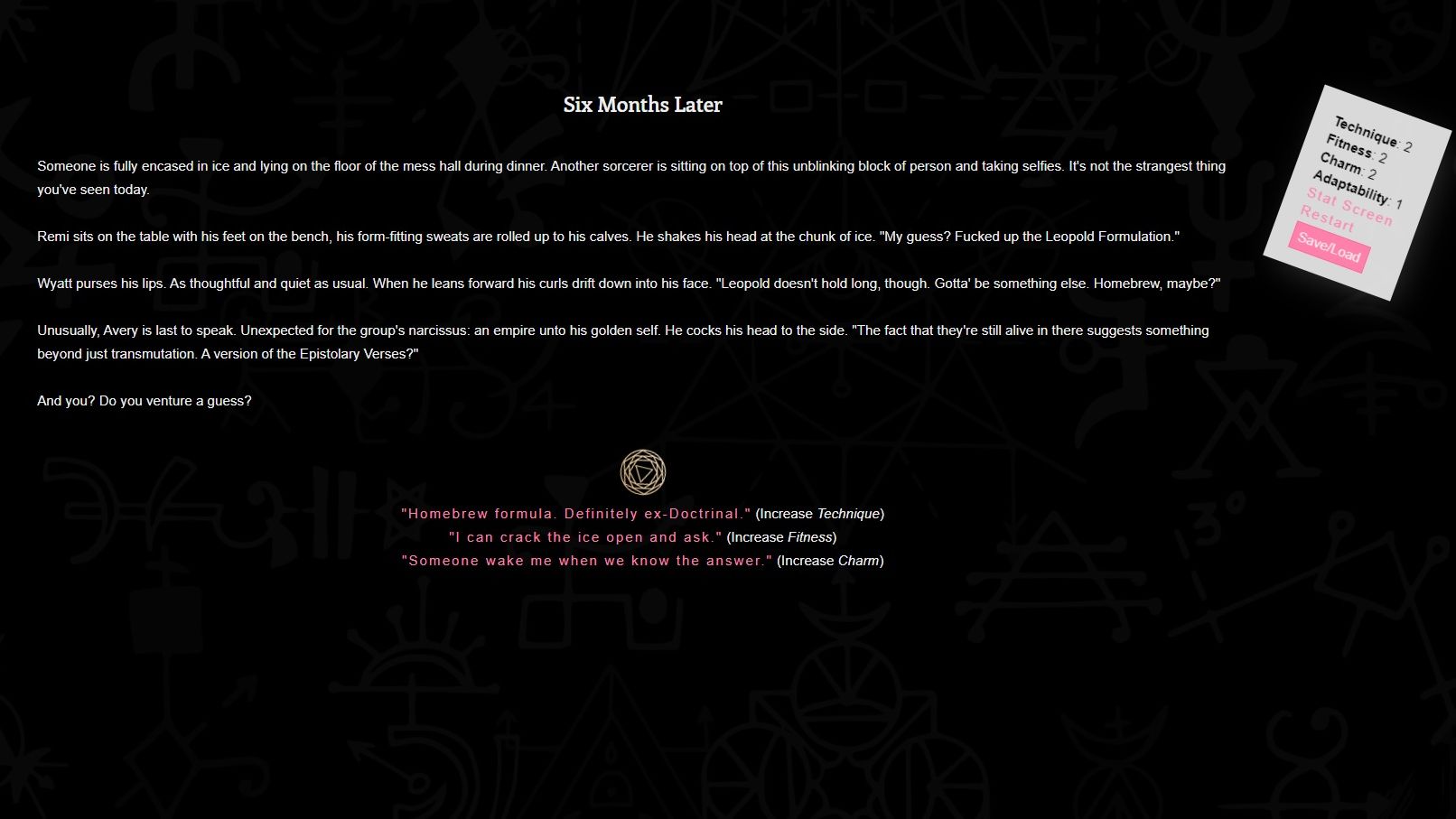The game dev and erotic fiction author Benji Bright (right) is using Twine to create an ongoing 18+ interactive salacious story of a sorcery academy called Doors. You can find the demo, including the first chunk of the narrative, for free or with a donation via his Itch page. Following Bright’s Twitter dragging of J.K. Rowling, it brings me pleasure to make this comparison: the sorcerers’ school in Doors could be a Master’s program at Hogwarts, but with a gothic edge and drenched in kink.
Doors makes use of a stat system in which your player character, named by you, can level up your fitness, charm, or technique. Implementing such a design, akin to traditional RPGs like Dragon Quest, helps the game stand out from other interactive fiction pieces that may stray from such elements. The labyrinthine visual design further brings the player into the seductive world of this sorcery school. I spoke to Benji Bright by email.
Where did the impetus behind the story of Doors come from?
Benji Bright: Right off the bat, this is a wild time to be releasing a game about a place where magic users come to hone their craft. Harry Potter is obviously a titan in this narrative space and I don’t think this game could have existed without it. That said, Doors is as much about what Harry Potter has left out of the cultural conversation as it is about what it’s added. Even with 7+ books and even more movies there’s a distinct lack of queer representation in that world, a worrisome lack of people of colour, and a myriad of other representational failings.
I don’t think it’s my job as a writer, especially not as a writer of colour, to fix the world of Harry Potter or scribble over the hideous views of its author, but I think there’s a sense for me of Doors trying to reconstruct the space that the Harry Potter series has occupied in my imagination. There are also stories like The Magicians (more the TV show) and Kieron Gillen’s comic DIE in the DNA of Doors. Both of these properties are in part about the dangers of wish fulfillment and I wanted to steal some of that lightning.
Having said all that, I’ve had the idea for Vesilind’s Crux — the sort of sorcerous training ground where the story of Doors begins — in my mind for a long time. It’s the setting of a serial I’ve been poking at for years called Easton Harp Learns Sorcery! In Easton Harp and in Doors one of the main themes is that magic is both seductive and dangerous. If those wielding it aren’t careful, they might just reproduce the very problems they were trying to fix and systemic abuses they were trying to undermine.
It’s kind of heavy for a sex game, I know, but I promise it’s not all doom and gloom. The premise of Doors involves moving between worlds which I did intentionally so that I could play with the tone of the different locales. An idea I nabbed from Sliders and Quantum Leap, but have run through the fantasy filter.
Erotic fiction often occupies a tenuous place. Many assume that simply “sex sells,” but the work can often get stigmatized, especially when the creator is queer and their work confronts kinds of sexual relationships that some players might balk at. Have you encountered pushback about your erotic work? And if so, how do you “stay the course,” so to speak - stay confident in what you’re making?
The very first piece of erotic fiction I ever wrote was an act of protest. I was in Jamaica, where my family is originally from, and the casual homophobia I witnessed really upset me. After about two weeks of non-stop comments and violent language aimed at queer people, I started writing a pornographic story just to reaffirm my own sexuality.
So sex writing has long been a part of my core values as a writer. I’m thankful and lucky that I haven’t received a lot of direct pushback, but we’re certainly in a culture where erotica or really the production of any kind of work that directly addresses sex in an artful way is, at best, treated like a fascinating curiosity. And trying to be visible as a creator of sexual content often means having your work gated behind a brick wall for fear that someone might actually come across it. Think of the Tumblr purge and related online crackdowns of sexual content. And then there’s the trouble of actually trying to get paid for sex writing, which is another whole rant by itself.
I know I’m painting a grim picture, but it’s not all bad! I think there’s always going to be room to inject queerness into game spaces. Until the market is flooded with sex games made by people of color, I’ll always have work worth doing and that motivates me, even when the money’s thin. (The money is always thin.)
Choosing the player character’s name and working with a stat system brings in the kinds of elements that one might find in a traditional RPG like Final Fantasy. What do these kinds of more traditional “game-like” elements bring to the player’s journey, in your view?
My games so far have been mostly narrative-first and told from a fixed perspective: “I tell you who you are and give you some choices” and that’s really it. Narrative games are good at that. But I’ve been itching for a while to write something a bit more expansive and, more importantly, to make a space where players can tailor their experience a bit.
It made a lot of sense to bring in some RPG-lite systems for Doors since one of the cornerstones of the narrative is about taking responsibility for your actions and their effects on the world, on yourself, and on your relationships. I wanted to ensure that the character the player builds feels personal without creating a combinatorial explosion for myself. So there are a few stats and in the latest build there’s an actual character building section. It’s all just a way for me to communicate a basic message to the player: “Hey, I see the choices you’re making and the game intends to respond to them.”
Twine remains one of the most user-friendly game development tools. For those looking to get into game dev, what resources might you recommend?
I wholeheartedly recommend Twine. I’ve been working in it for years and haven’t come close to maxing out the potential of the tool. However, what tools you use will depend on what you want to get out of the dev process. If you want to focus on storytelling then Twine, Ink, or Inform 7 are great places to start. If you want to get a little more graphical and move into visual novel territory there’s Ren’Py, which I’ve only used a little, but have heard good things. There are also some low barrier Unity tutorials and resources if you want to use a software that much of modern gaming is made in.
However, I will say that I don’t think the tools are necessarily as important as actually using them. If a person new to game development has the time, I’d recommend joining a game jam on itch.io and just making something. Anything! Then make something else. Keep the scope of your projects small and learn as you go. My first Twine game was terribly written, poorly edited, and never saw the light of day, but I couldn’t have made the next one without it.
What are you hoping that players get out of this experience (besides the obvious, which is pleasure)?
I’d like players to leave Doors with a sense of a connection to the world, one of the characters, or even a particular scene or sequence. I’ve always wanted to write erotica that has genuine texture to it: moments of surprising levity, affecting gravity, and a sense that there is something going on behind and beyond the sex. I think my ideal reaction to the game is a player sitting back in their chair after a play session and saying: “Huh. Ok. That was something.” If they’re also turned on, well then shit, I’ve done my job.


